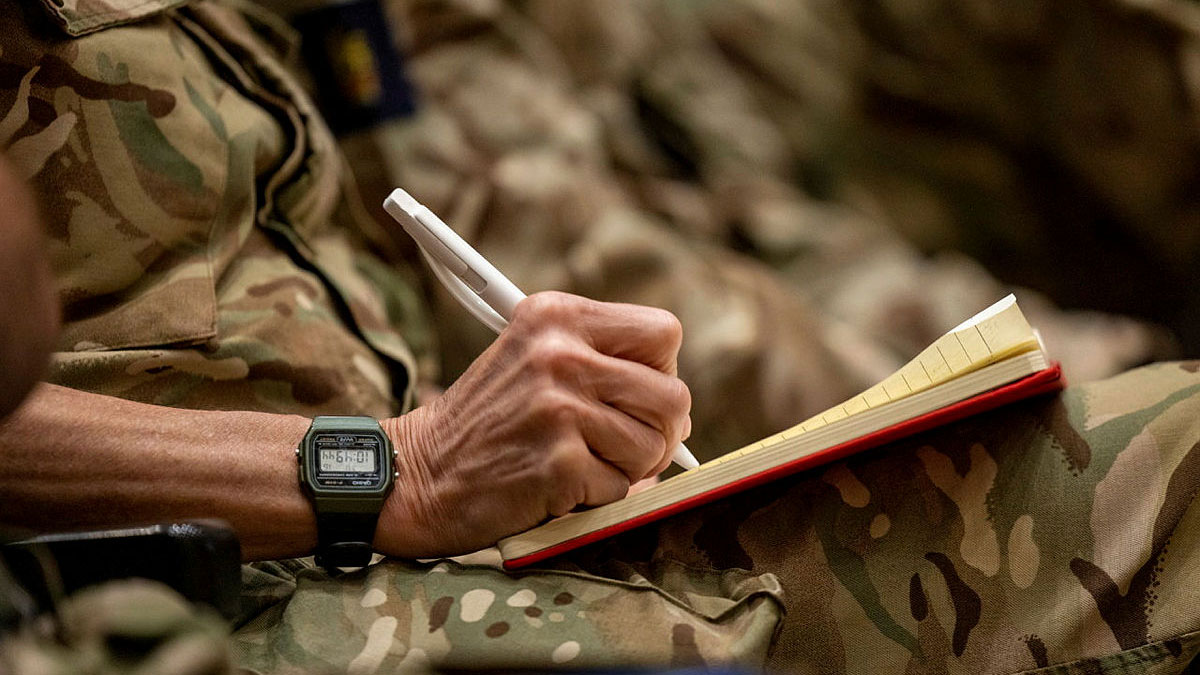
Sitrep: Is the defence spending increase as big as it seems and where will the money go?

The Government's announcement that defence spending will increase to 2.5% of GDP is "a waypoint on a longer journey" and is not the numerical "landmark" some believe it is.
A number of experts discussed the defence spending announcement on the latest episode of the Sitrep podcast – which analyses the top defence stories of the week and is available wherever you get your podcast.
Rishi Sunak pledged earlier this week an extra £75bn would be spent on defence as a continuation of a commitment made by the Conservative Party under former prime minister Boris Johnson.
Sitrep's resident expert, Professor Michael Clarke, told the podcast when he first saw the figure "it didn't look right".
"Within a couple of hours you could see what was probably wrong with it – it's not £75bn," he said.
Prof Clarke acknowledged that this planned increase was, however, a step in the right direction for defence spending.
"But when all is worked through by 2030, British defence will be back where it was in 2010," he said. "We're still making up ground that we've lost in the last decade and a half.
"That's the reality of it."
Also on the podcast was Ben Zaranko, senior research economist at the Institute for Fiscal Studies, who explained just how the £75bn figure is misleading.
"I think the number that's been chosen there has been picked because it's the biggest possible sounding number that gives the best possible headlines for the Government," he said.
"I don't think it's the most helpful way to look at it.
"I think that to get £75bn, you have to assume that otherwise defence would have received absolutely no increases at all.
"It would have been held constant in cash terms for seven years – now that would have meant breaching our commitments to Nato's."
He went on: "So, unless you think that until yesterday the Government was planning to abandon its Nato commitments, that number doesn't really make sense.
"This is a genuine increase for defence, but the £75bn number isn't very helpful."
But where will the money go?
Well, Prof Clarke said it has been outlined to him that the money should be spent "on making good the deficiencies in the forces presently".
"I think James Heappey made the point… we need to spend it on all the really boring stuff like stocks and spares and contingencies for various things, things that the public won't notice, but which will actually make the the defence forces more usable and more sustainable," he said.
"I would say… where possible, we just want more numbers of things.
"We don't need particularly to develop new technologies, which we're not already developing. We're quite far ahead on technology development.
"But when we have a technology, we just don't have enough units of it to make the difference that we hope," he added.
"I'd say two priorities, one is… sustaining the forces… and then the other one is just expanding the numbers of what we've got."
Malcolm Chalmers, deputy director general at the defence and security think tank Royal United Services Institute (RUSI), also told Sitrep some of the money should go on making military wages competitive.
However, he did say this would come at the cost of increasing troop numbers.
"I don't think it will allow the number of Armed Forces personnel to grow, not least because there's quite a lot of demand to spend more on better terms and conditions and a lot of demand to spend more on Armed Forces pay," he said.
"Especially for those areas in which increasingly the military is uncompetitive compared with the civilian sector.
"If you want to keep specialists, if you want to keep people with transferable skills who are absolutely essential to making all our great kit work, then you need to pay them competitive rates.
"That's going to take up, I think, a significant part of this."
Prof Clarke agreed with Mr Chalmers' opinion, adding that increased spending on retention within the Armed Forces would go a long way.
"Once they're in the forces, [they] have got to feel more cared for than they do," he said.
"It's all very well when somebody is 18 and single that they join up and it's a lifestyle and it's fun and it's what they want.
"But once they're married and they've got a child or two children and the accommodation isn't very good, then they think, well, how long am I going to stay in this?
"That's where… the Armed Forces are losing people and skills and experience."
You can listen to Sitrep wherever you get your podcasts, including on the Forces News YouTube channel.







